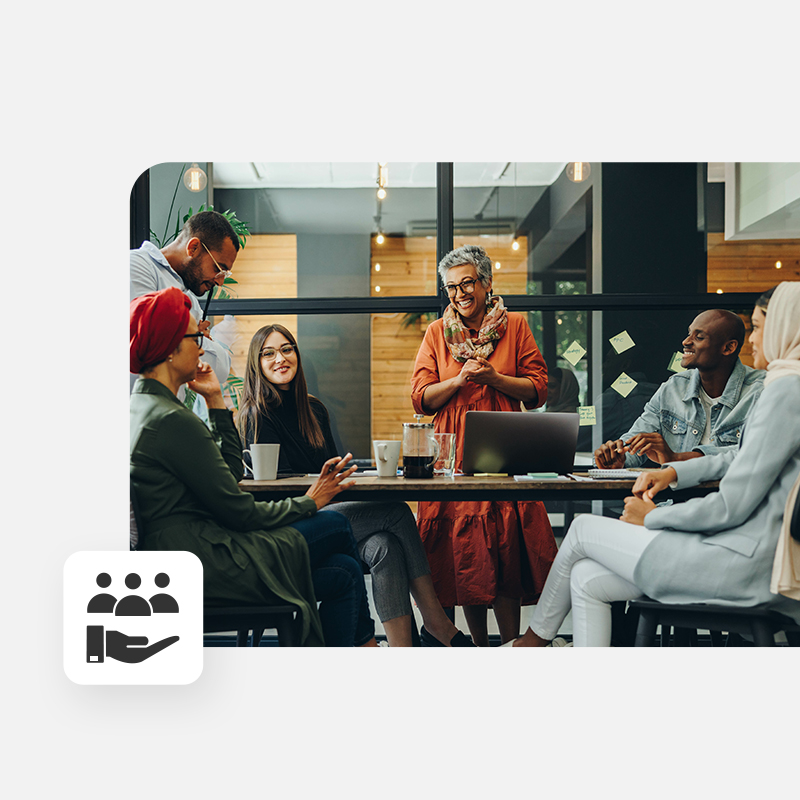Add a header block to begin generating the table of contents. This block will automatically update. Alternatively manually add items using the + button below. Once you have added at least one item this message will disappear.
Psychological safety is an important and often discussed topic, especially in the workplace. Coined by Harvard Business School Professor Amy Edmondson more than two decades ago as the “absence of interpersonal fear,” we know that psychological safety is foundational to diversity, equity, belonging, and inclusion (DEIB).
A two-year study by Google found that psychological safety is the most critical factor in any high-performing group and is critical for innovation. When people feel included, it is partly because they know they can safely voice their ideas, share their questions, and express who they are without fearing shame, humiliation, punishment, or retaliation. They can take risks, make mistakes, and be authentic.
But what does this actually look like ’‘on the ground” when it’s lived by leadership and employees? In honor of Pride Month, we asked Betterworks employees how they experience psychological safety day in and day out at work.
Bringing your whole self to work
Bruce: Psychological safety is all about being happy, comfortable, and feeling safe in bringing your ‘whole self’ to work. As a gay man, joining a new organization always includes the additional fears of ‘Will I be accepted?’ ‘Will people treat me differently if they know I’m gay?’ ‘Will being gay hold me back in my career?’
What can people do to support me and other gay people? First, be open and happy to talk to me about it. Like most married people, I love to talk about my spouse and the time we spend together, our shared passions, and our vacations. If people are in any way reluctant to acknowledge or talk to me as they would any of their ‘straight’ colleagues, I am immediately hurt and offended, and barriers are unnecessarily put between us.
Companies can help by, first of all, aiding with awareness, but also normalizing it. If senior people in a business know that I’m gay, I’m very happy for them to say something like, “I understand your husband knows about ‘x.’ Could you get his opinion on this?” Particularly in group calls or company events, just normalizing the fact that I am a married gay man and that they’re comfortable using that in their conversation helps everyone else to feel comfortable in the same way.
“What can people do to support me and other gay people? First, be open and happy to talk to me about it.”
bruce
I also look for the company I work for to hold LGBTQIA+ values in their work. That includes not doing business with people or companies linked to homophobic, transphobic, or similar stances. I was previously at an organization where they were selling to a company owned by an individual who supported the death penalty for LGBTQ people in his country. I made my company aware of this situation, and they agreed that I did not have to be involved in the sales process. For me, this was not enough. I expect a company to put its values before its bank balance in situations like this. The more this happens, the more change will occur in the world.
Psychological safety is promoted by an atmosphere of respect, caring, kindness, and, above all, clear equity and inclusion. When a company achieves these, as Betterworks has, the freedom to bring your whole self means that everyone benefits from the creativity and engagement this empowers.
Pervasive encouragement, kindness, and honesty
Jen: Having a manager who is honest and kind is so important for psychological safety. When someone is critical when you really try your best, it is the most deflating feeling. When that happens, I begin to shut down and pull away. I lose confidence in my abilities and begin to focus on negative outcomes.
I’m very fortunate not to have to deal with that experience here. Leadership across the board is extremely kind and encouraging, yet provides honest feedback. It feels authentic, which allows me not to feel nervous but focused and more positive in how I attack my work. In addition, it helps in my personal life because I don’t end the day feeling deflated.
“Leadership across the board is extremely kind and encouraging, yet provides honest feedback. It feels authentic, which allows me not to feel nervous but focused and more positive in how I attack my work.”
Jen
In addition to kind and supportive leadership, having colleagues who have the same perspective and are truly focused on doing all we can to make our company the best it can be without drama and negativity is HUGE. When we all are focused on encouraging and helping each other, it has a huge effect on our ability to succeed. It also pushes me to be a better person and to provide encouragement and help to others.
Accept all forms of gender expression
Max: I identify as non-binary and asexual. I prefer the pronouns they/them, but I also understand that since I present male for the most part, he/him is probably more natural for most people. In many ways, life in the workplace isn’t as difficult in 2023 as maybe 20 years ago. Back then, those of us who identified in the way we do were considered oddities or, if male-presenting, expected to participate in or cover for bad behavior on the part of others. I found that since I didn’t follow prescribed gender-based roles with my family (in large part due to my identity) and was often more maternal than paternal, there were consequences to my career as a result.
While workplace rules of engagement, non-discrimination, family policy, and such have made it easier for many to find practical safety in the workplace, psychological safety can be hard to navigate for those in the gray areas of the LGBTQIA+ space. The LGT parts are easy enough to identify, and allyship is easy enough to define, but what about those who are not so easily identifiable?

There is often a tendency to urge people to “pick a side” or see our identities as “invented” or from a desire to be “exotic.” Just as 30, 40, or 50 years ago, LG&T people were told to stop being “the drama” or to stop looking for attention, many people in the BQIA+ spaces hear that a lot today. It’s often just easiest to fly under the radar and assimilate into cis-hetero-normative spaces.
As I open up at work, my concern is not about practical repercussions but more about it being a distraction from my presence at work. Tech is still a very hetero-cis-male culture, even when not intended or even desired. Navigating it among peers who might tolerate it, but not accept it, is still something I am trying to figure out. I do feel encouraged at the apparent non-issue it has been for some others here, and I am taking steps to be more open about it.
Being open and being accepted for who you are
Jenna: As a queer person, I think what makes me feel safe, seen, and honored at work is just knowing I can be myself without fear of judgment or harassment. In the beginning, that meant coming out in the first moments I was introduced to the company, via my intro email, where I mentioned my wife and family. Having the opportunity and platform to introduce myself fully was very much appreciated. It felt like a safe way to put it out there versus having to “come out” repeatedly in conversations with people in those first days, weeks, and months. I think that’s something that cis/hetero folks don’t have to think about or experience as much. When your identification is the majority, you don’t feel vulnerable as often.
“Having the opportunity and platform to introduce myself fully was very much appreciated. It felt like a safe way to put it out there versus having to “come out” repeatedly in conversations with people in those first days, weeks, and months.”
Jenna
Openness and willingness to connect
Andrea: The thing about Betterworks that makes me proud about our culture is that this is a safe place. I can’t put a pin on one thing that makes this a safe place. It’s a feeling, an energy, an understanding that’s embedded in our culture. Even starting as a new hire, you feel it. Everyone is accepted. Everyone. This is one of the many things I love about Betterworks.
The energy happens when two people connect and realize they can talk to each other about a specific topic: things going on in life that spill into work. And then another person comes into the fold that adds to the topic. At this point, it permeates as more people come into the fold. A sense of caring unfolds. And then it becomes part of the culture: people are open and willing to listen, to care, to share. It becomes part of our DNA that shows on the outside. It’s welcoming.
For example, someone who I hadn’t previously known well recently lost their pet. They felt safe enough to explain why they couldn’t do something work-related. That person shared one thing, and I felt it was ok to open the door and ask what happened. It formed into a bigger conversation about a similar situation in my life: a shared moment. This formed a bond that would otherwise have been harder to do in other places I’ve worked. I now feel closer to this individual and let this person know I’m here to listen. All this in a 100% remote work environment.
I’ve been in other work environments where it’s very clear your opinion does not matter. It’s a look or a dismissive tone after something is said. When your workplace isn’t a safe place to speak up, ideas are missed. Collaboration wanes. Discretionary effort goes by the wayside. High performers leave. This leaves an organization stuck in the past while competitors push ahead.

Being authentic and embracing our differences
Kristen: As a member of Betterworks’ DEIB team, I have often discussed with other members that the key to empowering individuals in any organization to speak up, share ideas, and display leadership at all levels relies on the ability of the company and its employees to create and foster a culture where people feel comfortable being authentically themselves. Every single person at our company is truly unique, and that uniqueness is celebrated.
I also believe that leadership and participation look different for everyone and that personal attributes don’t indicate an individual’s preference, ability, intelligence, or otherwise. It does seem that successful companies understand that creating a psychologically safe environment means embracing the differences of all team members and that their variety of backgrounds and perspectives ultimately enhance the quality of work. This is where Betterworks excels: Our team is collaborative across time zones, cultures, and levels of experience, and leaders embrace contributions in any form from everyone in our company. Some people are more comfortable speaking up than others and that is more than okay.
“It does seem that successful companies understand that creating a psychologically safe environment means embracing the differences of all team members and that their variety of backgrounds and perspectives ultimately enhance the quality of work.”
Kristen
Respecting others is the basis of our team dynamic. I most recently observed this in our company hackathon, which was open to ideas from any team member. The process was transparent and easy to understand, and teams were formed based on interest rather than technical skill. It’s refreshing to see a company place value on the fact that people not only inherently have differences but also think differently and work differently.
Curious about learning how these ideas flow down from the top? Read From Allies to Advocates: Ensuring an Inclusive Workplace for All.


